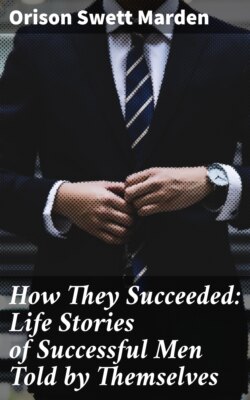Читать книгу How They Succeeded: Life Stories of Successful Men Told by Themselves - Orison Swett Marden - Страница 30
На сайте Литреса книга снята с продажи.
FOOTING IT TO CALIFORNIA
ОглавлениеTable of Contents
“When did you leave the farm for a mercantile life?” I asked.
“I was a clerk in a store in Stockbridge for two years, after I was seventeen, but was engaged with the farm more or less, and wanted to get out of that life. I was a little over seventeen years old when the California gold excitement of 1849 reached our town. Wonderful tales were told of gold already found, and the prospects for more on the Pacific coast. I brooded over the difference between tossing hay in the hot sun and digging up gold by handfuls, until one day I threw down my pitchfork and went over to the house and told mother that I had quit that kind of work.
“People with plenty of money could sail around Cape Horn in those days, but I had no money to spare, and so decided to walk across the country. That is, we were carried part of the way by rail and walked the rest. I persuaded one of the neighbor’s boys, Calvin Gilbert, to go along with me, and we started.
“I provided myself with an old carpet sack into which to put my clothes. I bought a new pair of boots, and when we had gone as far as we could on canals and wagons, I bought two oxen. With these we managed for awhile, but eventually reached California afoot.”
Young Armour suffered a severe illness on the journey, and was nursed by his companion Gilbert, who gathered herbs and steeped them for his friend’s use, and once rode thirty miles in the rain to get a doctor. When they reached California, he fell in with Edward Croarkin, a miner, who nursed him back to health. The manner in which he remembered these men gives keen satisfaction to the friends of the great merchant.
“Did you have any money when you arrived at the gold-fields?”
“Scarcely any. I struck right out, though, and found a place where I could dig, and I struck pay dirt in a little time.”
“Did you work entirely alone?”
“No. It was not long before I met Mr. Croarkin at a little mining camp called Virginia. He had the next claim to mine, and we became partners. After a little while, he went away, but came back in a year. We then bought in together. The way we ran things was ‘turn about.’ Croarkin would cook one week, and I the next, and then we would have a clean-up every Sunday morning. We baked our own bread, and kept a few hens, which kept us supplied with eggs. There was a man named Chapin who had a little store in the village, and we would take our gold dust there and trade it for groceries.”
